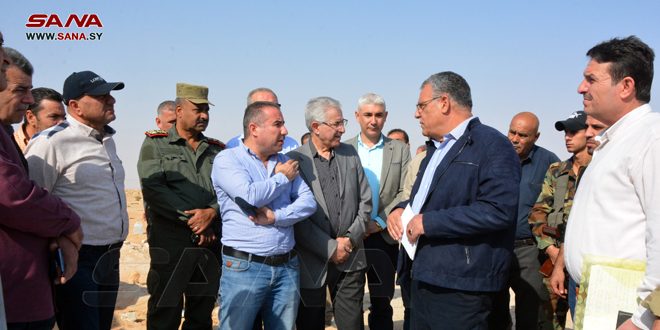The Minister of Agriculture and Agrarian Reform, Eng. Muhammad Hassan Qatana, noted that the agricultural plan for the current year included planting the largest possible area of wheat in the Western Al-Bayarat area (Orchards) in Palmyra, and investing all self-flowing wells in the Badia, with the aim of providing large quantities of this crop, which is one of the most important food security crops.
In a statement to reporters during his tour in the agricultural projects on the Homs axis, the minister underlined the importance of being briefed on the agricultural activities in this area, and meeting with a number of livestock breeders, to identify the difficulties they face, especially in terms of securing fodder.
Minister Qatana was also briefed on a project to implement solar energy to operate the well in Palmyra orchards, which provides free water to local residents and livestock breeders around the clock, with an abundance of 30 cubic meters per hour.
The Minister of Agriculture toured the palm center in Palmyra, which suffered great damage and destruction as a result of terrorism, pointing out that the ministry is currently working on restoring it.
Minister Qatana also toured the Ferglus Fodder Center and was briefed on the quantities stored in it, the unloading mechanism and the distribution of fodder rations for livestock breeders.
In turn, Director of Agriculture in Homs, Engineer Younis Hamdan, pointed out that the Homs plan for the next season includes planting 17,420 hectares of irrigated wheat, and 21,804 hectares of rainfed wheat, pointing out that the plan for planting wheat in the Western Al-Bayarat area in Palmyra is 2,661 hectares, and could reach 3000 Hectare.
For his part, Head of the Palm Propagation Center in Palmyra, Eng. Ahmed Youssef, indicated that the center’s area is 1,000 dunums, and the number of trees in it is currently 2,600, pointing out that work is currently underway to plant date palms of the same varieties that existed previously.
Director of the Fodder Foundation branch in Homs, Dr. Khaled Tawila, indicated that the Al-Ferglus Fodder Center covers the needs of 2,500 breeders, pointing out that the Foundation is currently distributing rationed feed for sheep, goats and camels.
A number of farmers and livestock breeders called for the necessity of securing wheat seeds and fertilizers, especially nitrogen, in sufficient quantities, because Al-Bayarat area is considered a fifth stability area whose needs differ from the rest of the regions and to facilitate the transfer of livestock.
Inas Abdulkareem

